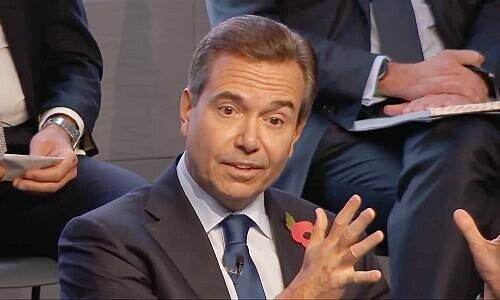Chairman António Horta-Osório cleans up Credit Suisse under the new strategy while major investors call for significant divestments.
At the recent Credit Suisse investor day in London, António Horta-Osório (image below) was extensively criticized for doing little more than shifting the business emphasis of Switzerland's second-largest bank from one area to another.

He was also heavily questioned for not providing more clarity on the bank's leadership under the new strategy. The market did not take the news particularly well, pushing the bank's share price down 5 percent.
But a well-connected investment banker asked by finews.com had a far more receptive take on the chairman's actions.
Reasonable Effort
Horta-Osório did what he reasonably could with what he was given, the banker said. He was cutting the investment bank's risk profile and shifting capital into areas that generate stable earnings.
He also welcomed the efforts to improve risk management and change the bank's culture from the inside.
«Horta-Osório is cleaning house», the dealmaker summed up.
New Bridges
The question is why such housecleaning is even necessary. Many interpreted the new strategy as putting an increased emphasis on the divisions while reining in regional activities. But it should also help build clear points of delineation.
The reason. It will be far easier to divest certain businesses than it would have been under ex-chairman Urs Rohner.
David Herro, investment chief of Harris Associates and Credit Suisse's largest shareholder, has publicly said exactly that. In a media interview, he discussed Credit Suisse's options related to its merging of the asset management business with that of UBS or another financial institution and also talked about folding the investment banking activities into one of its competitors.
Other media reports saw investors continuing to demand an internal revolution. The clients of the now-shuttered prime services business have already seen that happen after Credit Suisse reached a referral arrangement with BNP Paribas.
Toshiba and General Electric Show the Way
Divestments and business disposals happen regularly in other sectors. General Electric just announced that it was separating into three businesses while Toshiba is considering whether it should do the same.
That seems to happen less in banking. Even though Citigroup essentially went bankrupt during the financial crisis, regulators decided at the time it was better to keep it intact as one entity.
In the UK, the major banks RBS, Barclays and Lloyds Bank, which was run by Horta-Osório as CEO, were also saved with government money.
The same goes for Germany, where it was unthinkable to leave Deutsche Bank to the vagaries of the market during the dark hours of 2019. But does the same hold true with the Swiss establishment?
Swiss Rescue
That is a very central question for many observers. In 2009, the Swiss National Bank and the government saved UBS with tax money but would they do the same for Credit Suisse it if decided to split up? Or if it was on the wrong end of an unfriendly takeover bid?
The investment banker said he believed that the country's establishment would protect the bank. To that end, UBS chief Ralph Hamers recently told a closed circle that Switzerland had to think about whether it even wanted a national banking champion.
A Swiss way out including UBS, as chairman Axel Weber looked at in a confidential internal project called «Signal» could be on the way more quickly than many expect, particularly if there are any more nasty surprises at Credit Suisse.
Decisive Question
That could change everything, the same source told finews.com, as there is no Swiss chairman there to protect Credit Suisse anymore.
Horta-Osório discussed the issue of a potential merger with the «NZZ» (behind paywall, in German). «The question as to how we generate the most value for clients and shareholders is decisive for us. The strategy we announced already answers that question.»
On the Sidelines
The investment banker does say that one thing is very clear. Credit Suisse is on the sidelines after the Archegos, Greensill, Mozambique and Spygate debacles.
Their only escape might be to do something dramatic from that point of view, the source adds. «Credit Suisse will never be what it once was.»




































